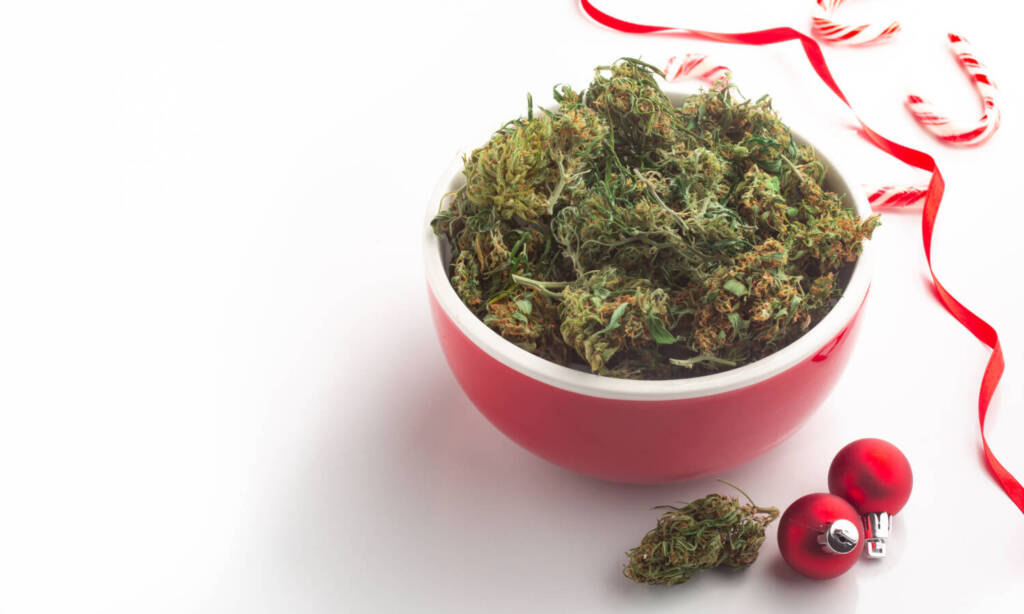Business
You Received Weed As A Holiday Gift — Here’s What You Should Know

Steer your sleigh away from legal gray areas so you can enjoy the rest of your holiday season without a trip to the courthouse.
Weed is a fun gift to give, and even more fun to receive. If you get marijuana as a gift, especially in a public or group setting, you may wonder what the etiquette (and legality) is. This is, after all, new territory for most gift-giving Americans.
Whether you have given weed or received it this holiday season, there are things to know to make sure you do so legally, and without spoiling any holiday gathering or getting arrested.

With the continued legalization of recreational cannabis, the market for marijuana gifts and merchandise have exploded. There are holiday gift sets, unique packaging and even holiday-flavored edibles.
A poll conducted by Jushi Holdings found that cannabis consumers 21 years and older in adult-use states overwhelmingly plan to consume cannabis as part of their holiday celebrations this season.
This means if you are a cannabis lover in a state where marijuana is legal, you likely found some form of THC under the tree this year. The first thing you should understand is exactly what a “gift” is.
Defining a “Gift”
When you receive weed as a gift, it must be received without any anticipation of payment or compensation. “‘Gifting’ pot and then receiving payment later, or reciprocal ‘gifts’ of pot and items of value: illegal,” wrote the Boston Globe regarding its state’s marijuana laws.
This means if you receive a weed gift, you should not give your friend a card with 100 bucks in it. Although it may be an actual Christmas gift exchange, you should always be aware of how things can appear to an outsider. As a rule, don’t mix weed gifts and cash-related gifts whenever possible.
Read the Room, and State Laws
When someone gives you weed as a gift, it is understandable that your initial jubilance may give way to apprehension. Marijuana and its legality is a complicated and often stressful subject. Not only are laws often changing, but the laws themselves can be murky at times. This is particularly true when it comes to gifting marijuana.

In some places, like Washington D.C., “gifting” is one of the only legal ways to exchange marijuana from one person (or business) to another person. Other states, like Florida, have legalized medical marijuana but still have very strong penalties for marijuana possession outside of the medical realm.
Before you light up your recently received gift, be sure to know the laws. It may also benefit you to read the room and see who is around you. Even where marijuana is legal, it is always illegal for minors. If you are at a holiday gathering with minors, best practice is to save your gift for the after party, or for the privacy of your home.
Don’t Feel Obligated to Partake in the Moment
When you receive a gift, there is often an unspoken pressure to show your appreciation by using the gift right away. When it comes to weed, do not let yourself feel obligated. If the person who gave you weed wanted you to smoke with them, they should have brought enough for the two of you to enjoy.
“A pack of pre-rolls or some potent bud is thoughtful but don’t assume they’re going to smoke it on the spot. If you want to join your pal, bring extra,” wrote MedMen in regards to gifting weed.
When you receive weed as a gift, you don’t need to feel pressure; you only need to give thanks. Let the gift exchange only further the holiday cheer, and steer your sleigh away from legal gray areas so you can enjoy the rest of your holiday season without a trip to the courthouse.
Source: https://thefreshtoast.com/how-to/you-received-weed-as-a-holiday-gift-heres-what-you-should-know/
Business
New Mexico cannabis operator fined, loses license for alleged BioTrack fraud

New Mexico regulators fined a cannabis operator nearly $300,000 and revoked its license after the company allegedly created fake reports in the state’s traceability software.
The New Mexico Cannabis Control Division (CCD) accused marijuana manufacturer and retailer Golden Roots of 11 violations, according to Albuquerque Business First.
Golden Roots operates the The Cannabis Revolution Dispensary.
The majority of the violations are related to the Albuquerque company’s improper use of BioTrack, which has been New Mexico’s track-and-trace vendor since 2015.
The CCD alleges Golden Roots reported marijuana production only two months after it had received its vertically integrated license, according to Albuquerque Business First.
Because cannabis takes longer than two months to be cultivated, the CCD was suspicious of the report.
After inspecting the company’s premises, the CCD alleged Golden Roots reported cultivation, transportation and sales in BioTrack but wasn’t able to provide officers who inspected the site evidence that the operator was cultivating cannabis.
In April, the CCD revoked Golden Roots’ license and issued a $10,000 fine, according to the news outlet.
The company requested a hearing, which the regulator scheduled for Sept. 1.
At the hearing, the CCD testified that the company’s dried-cannabis weights in BioTrack were suspicious because they didn’t seem to accurately reflect how much weight marijuana loses as it dries.
Company employees also poorly accounted for why they were making adjustments in the system of up to 24 pounds of cannabis, making comments such as “bad” or “mistake” in the software, Albuquerque Business First reported.
Golden Roots was fined $298,972.05 – the amount regulators allege the company made selling products that weren’t properly accounted for in BioTrack.
The CCD has been cracking down on cannabis operators accused of selling products procured from out-of-state or not grown legally:
- Regulators alleged in August that Albuquerque dispensary Sawmill Sweet Leaf sold out-of-state products and didn’t have a license for extraction.
- Paradise Exotics Distro lost its license in July after regulators alleged the company sold products made in California.
Golden Roots was the first alleged rulebreaker in New Mexico to be asked to pay a large fine.
Source: https://mjbizdaily.com/new-mexico-cannabis-operator-fined-loses-license-for-alleged-biotrack-fraud/
Business
Marijuana companies suing US attorney general in federal prohibition challenge

Four marijuana companies, including a multistate operator, have filed a lawsuit against U.S. Attorney General Merrick Garland in which they allege the federal MJ prohibition under the Controlled Substances Act is no longer constitutional.
According to the complaint, filed Thursday in U.S. District Court in Massachusetts, retailer Canna Provisions, Treevit delivery service CEO Gyasi Sellers, cultivator Wiseacre Farm and MSO Verano Holdings Corp. are all harmed by “the federal government’s unconstitutional ban on cultivating, manufacturing, distributing, or possessing intrastate marijuana.”
Verano is headquartered in Chicago but has operations in Massachusetts; the other three operators are based in Massachusetts.
The lawsuit seeks a ruling that the “Controlled Substances Act is unconstitutional as applied to the intrastate cultivation, manufacture, possession, and distribution of marijuana pursuant to state law.”
The companies want the case to go before the U.S. Supreme Court.
They hired prominent law firm Boies Schiller Flexner to represent them.
The New York-based firm’s principal is David Boies, whose former clients include Microsoft, former presidential candidate Al Gore and Elizabeth Holmes’ disgraced startup Theranos.
Similar challenges to the federal Controlled Substances Act (CSA) have failed.
One such challenge led to a landmark Supreme Court decision in 2005.
In Gonzalez vs. Raich, the highest court in the United States ruled in a 6-3 decision that the commerce clause of the U.S. Constitution gave Congress the power to outlaw marijuana federally, even though state laws allow the cultivation and sale of cannabis.
In the 18 years since that ruling, 23 states and the District of Columbia have legalized adult-use marijuana and the federal government has allowed a multibillion-dollar cannabis industry to thrive.
Since both Congress and the U.S. Department of Justice, currently headed by Garland, have declined to intervene in state-licensed marijuana markets, the key facts that led to the Supreme Court’s 2005 ruling “no longer apply,” Boies said in a statement Thursday.
“The Supreme Court has since made clear that the federal government lacks the authority to regulate purely intrastate commerce,” Boies said.
“Moreover, the facts on which those precedents are based are no longer true.”
Verano President Darren Weiss said in a statement the company is “prepared to bring this case all the way to the Supreme Court in order to align federal law with how Congress has acted for years.”
While the Biden administration’s push to reschedule marijuana would help solve marijuana operators’ federal tax woes, neither rescheduling nor modest Congressional reforms such as the SAFER Banking Act “solve the fundamental issue,” Weiss added.
“The application of the CSA to lawful state-run cannabis business is an unconstitutional overreach on state sovereignty that has led to decades of harm, failed businesses, lost jobs, and unsafe working conditions.”
Business
Alabama to make another attempt Dec. 1 to award medical cannabis licenses

Alabama regulators are targeting Dec. 1 to award the first batch of medical cannabis business licenses after the agency’s first two attempts were scrapped because of scoring errors and litigation.
The first licenses will be awarded to individual cultivators, delivery providers, processors, dispensaries and state testing labs, according to the Alabama Medical Cannabis Commission (AMCC).
Then, on Dec. 12, the AMCC will award licenses for vertically integrated operations, a designation set primarily for multistate operators.
Licenses are expected to be handed out 28 days after they have been awarded, so MMJ production could begin in early January, according to the Alabama Daily News.
That means MMJ products could be available for patients around early March, an AMCC spokesperson told the media outlet.
Regulators initially awarded 21 business licenses in June, only to void them after applicants alleged inconsistencies with how the applications were scored.
Then, in August, the state awarded 24 different licenses – 19 went to June recipients – only to reverse themselves again and scratch those licenses after spurned applicants filed lawsuits.
A state judge dismissed a lawsuit filed by Chicago-based MSO Verano Holdings Corp., but another lawsuit is pending.
Source: https://mjbizdaily.com/alabama-plans-to-award-medical-cannabis-licenses-dec-1/
-

 Business2 years ago
Business2 years agoPot Odor Does Not Justify Probable Cause for Vehicle Searches, Minnesota Court Affirms
-

 Business2 years ago
Business2 years agoNew Mexico cannabis operator fined, loses license for alleged BioTrack fraud
-

 Business2 years ago
Business2 years agoAlabama to make another attempt Dec. 1 to award medical cannabis licenses
-

 Business2 years ago
Business2 years agoWashington State Pays Out $9.4 Million in Refunds Relating to Drug Convictions
-

 Business2 years ago
Business2 years agoMarijuana companies suing US attorney general in federal prohibition challenge
-

 Business2 years ago
Business2 years agoLegal Marijuana Handed A Nothing Burger From NY State
-

 Business2 years ago
Business2 years agoCan Cannabis Help Seasonal Depression
-

 Blogs2 years ago
Blogs2 years agoCannabis Art Is Flourishing On Etsy













